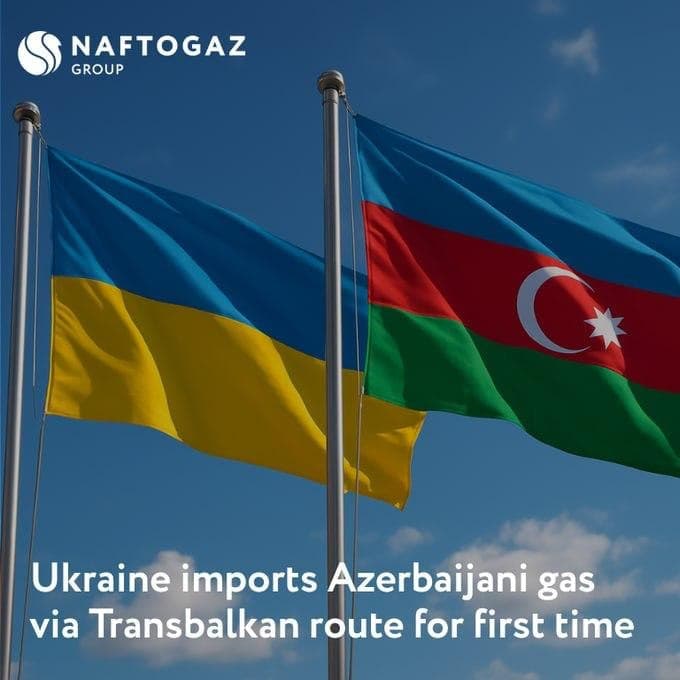Ukraine Secures First Azerbaijani Gas Shipment, Boosting Energy Independence
In a significant move towards energy diversification and independence, Ukraine has successfully imported Azerbaijani gas for the first time, marking a pivotal moment in its energy strategy. The test delivery was facilitated through the Bulgaria-Romania-Ukraine corridor, and the deal was finalized between Naftogaz and SOCAR Energy Ukraine. This development comes at a time when Ukraine is actively seeking to reduce its reliance on Russian gas amid ongoing geopolitical tensions.
Background & Context
Ukraine"s energy landscape has been heavily influenced by its historical dependence on Russian gas supplies, which has posed challenges, especially in the wake of the ongoing conflict with Russia. In recent years, Ukraine has made concerted efforts to diversify its energy sources, recognizing the need for greater energy security. The import of Azerbaijani gas represents a strategic shift, aligning with Ukraine"s long-term goals of energy independence and diversification.
The Bulgaria-Romania-Ukraine corridor, a crucial transit route for energy supplies, has been gaining traction as a viable alternative for gas imports. This corridor not only enhances energy security for Ukraine but also strengthens regional cooperation among European nations that are seeking to reduce their reliance on Russian energy. In this context, the test delivery of Azerbaijani gas is seen as a crucial step toward establishing a more resilient energy infrastructure in the region.
Key Developments
The recent agreement between Naftogaz and SOCAR Energy Ukraine signals a growing partnership between Ukraine and Azerbaijan in the energy sector. Under this deal, the initial test delivery of gas is expected to pave the way for larger shipments in the future, enhancing Ukraine"s energy supply and stability. Naftogaz"s CEO emphasized the importance of this delivery, stating that it represents a "new chapter" in Ukraine"s energy journey.
This transaction is not merely a logistical achievement but also a political statement, showcasing Ukraine"s determination to seek alternative sources of energy amidst the ongoing conflict. SOCAR Energy Ukraine, a subsidiary of the State Oil Company of Azerbaijan Republic, is poised to play a central role in supplying gas to Ukraine, further solidifying the ties between the two nations.
Broader Impact
The implications of this gas shipment extend beyond Ukraine"s borders. As European nations grapple with the need to reduce dependency on Russian energy, Ukraine"s successful import of Azerbaijani gas could serve as a model for other countries in the region. This development has the potential to reshape the energy dynamics in Eastern Europe, fostering greater collaboration among nations in pursuit of energy security.
Energy experts have lauded this move, suggesting that it could lead to increased competition in the gas market, ultimately benefiting consumers through lower prices and more stable supply. Furthermore, this shift aligns with broader geopolitical trends, as nations seek to assert their energy sovereignty in the face of external pressures. Earlier coverage of similar situations has highlighted the importance of diversifying energy sources, particularly in conflict-prone regions.
What"s Next
Looking ahead, the successful test delivery of Azerbaijani gas is expected to catalyze further developments in Ukraine"s energy sector. Naftogaz and SOCAR are likely to explore the potential for larger-scale imports, which could significantly enhance Ukraine"s energy resilience. Additionally, the ongoing collaboration between Ukraine and Azerbaijan may inspire other countries to pursue similar partnerships, expanding the network of alternative energy sources in the region.
As Ukraine continues to navigate its complex energy landscape, the focus will remain on diversifying its energy portfolio and reducing vulnerabilities. The recent developments underscore the importance of regional cooperation and the need for strategic partnerships to achieve long-term energy security. With the backdrop of ongoing geopolitical tensions, the implications of this gas shipment are likely to resonate throughout the region as countries assess their own energy strategies in a rapidly changing global landscape.


![[Video] Heavy clashes and gunfire reported in Baghdad, Iraq](/_next/image?url=%2Fapi%2Fimage%2Fthumbnails%2Fthumbnail-1768342239932-848qsh-thumbnail.jpg&w=3840&q=75)




![[Video] Gunfire between Iraqi security forces and Sadr militias in Baghdad](/_next/image?url=%2Fapi%2Fimage%2Fthumbnails%2Fthumbnail-1768343508874-4redb-thumbnail.jpg&w=3840&q=75)
